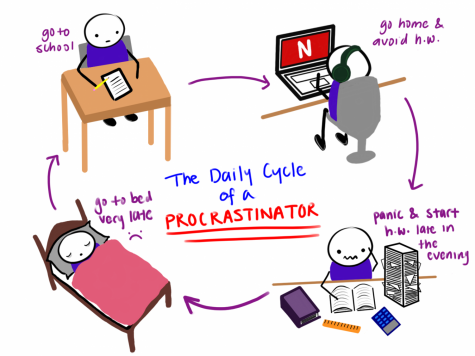5 Reading #5: Goal setting and procrastination
All of us have things we want to accomplish. We have the best of intentions, but time often slips away and before we know it a month or two have passed and nothing has changed. Many of you begin the program saying that you want to achieve new skills, get good grades, participate in class, procrastinate less with assignments, and get to know new people…but you often don’t get there. You stay stuck:
In this class we ask you to think about setting goals for yourself to improve your communication and helping skills. The 10 steps below can help with that. Here are some strategies for goal setting and change:
- Set a goal: state it in the positive and be specific. Vague desires are not goals; they are dreams.
- Understand and accept trade-offs: every goal has unpleasant aspects. Identify the good things, “I will be able to build stronger relationships; I will be able to communicate with people who have different views than mine; I will be able to build new skills.” And the not so good things, “I will have to attend class; I will have to organize my time; I will have to do my homework.”
- Commit to your goal: being uncertain is disastrous. Success does not come from thinking about it. Success comes from deciding to do it. Choose a goal that is meaningful and honest for you.
- Set a deadline: deadlines give goals a framework for action. You cannot reach a goal without a meaningful deadline.
- Commit to the deadline: make your deadline real. Make it mean something to you.
- Tell people: make your goal real by sharing it with others. Say it out loud and put it on paper.
- Outline the steps required to achieve your goal: It is easier to take many small steps than one big leap.
- Get help: since we have to learn things that are new to us we are inexperienced. Friends/colleagues/professors can often assist you.
- Take immediate action: your commitment can slip as time goes by. Start working on your change today.
- Commit again and again: for changes to occur you have to embrace them over and over. Take it step by step but keep moving forward.
What we are talking about here is the S.M.A.R.T. goal model. Watch the video below to help you set goals and achieve them:
Use this tool to help you create smart goals for your concept paper activities. You can print directly from the tool and submit with your concept paper.
Procrastination
Contrary to what you might think, procrastination is not about laziness or poor time management. It is about emotion regulation. Review the resources below to learn more about procrastination and to gets tips on how to avoid it:
- Read: Why You Procrastinate (It Has Nothing to Do With Self-Control)

- Listen: to this radio interview
- Watch: THIS VIDEO
The real reasons you procrastinate — and how to stop
